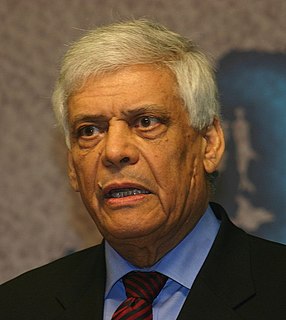A Quote by Thomas Friedman
Oil is a tangible commodity, so there is a global market. The fact that we may need less may affect the global price because we're big consumers: we probably take about a quarter of global demand. But if suddenly, let's just use a crazy example, fighting in the Middle East led to the closure of the Strait of Hormuz and no oil could get out through the Strait of Hormuz, well that would affect China, India, Europe, it will affect the whole global economy. It will affect us, too, then.
Quote Topics
About
Affect
Because
Big
China
Closure
Commodity
Consumers
Could
Crazy
Demand
East
Economy
Europe
Example
Fact
Fighting
Get
Global
Global Economy
Global Market
India
Just
Led
Less
Market
May
Middle
Middle East
Need
Oil
Out
Price
Quarter
Suddenly
Take
Tangible
Then
Through
Too
Us
Use
Well
Whole
Will
Would
Related Quotes
You cannot just depend on the market, because the market will say: China needs oil; China needs coal; China needs whatever, and Africa has got all these things in abundance. And we go there and get them, and the more we develop the Chinese economy, the larger the manufacturing is, the more we need global markets - sell it to the Africans which indeed might very well destroy whatever infant industries are trying to develop on the continent. That is what the market would do.
Global warming may be a 'crisis,' even 'the most pressing environmental problem of our time.' ... Indeed, it may ultimately affect nearly everyone on the planet in some potentially adverse way, and it may be that governments have done too little to address it. It is not a problem, however, that has escaped the attention of policymakers in the Executive and Legislative Branches of our Government, who continue to consider regulatory, legislative, and treaty-based means of addressing global climate change.
With the United States in slow long-term decline, how will that affect the position of English? And where will all that leave monolingual Britain? Our political leaders like to boast about how global Britain is, but when it comes to languages, it is near the bottom of the global league, together with another island state, Japan.
The decision-making process in the White House does not let most issues get up to the President. The Council thought opening up global markets to derivatives that would destabilize other countries wasn't likely to create a lot of jobs in the U.S. and might adversely affect U.S. interests by causing global economic instability.
The different policies reduce damages by only a modest amount. Indeed, one of the surprises is how little the policies affect the damages from global warming. The reasons are that, because there is so much inertia in the climate system and because the Protocol reduced the global temperature increase by only a fraction of a degree over the next century.
Then there is another area of activity - economic interaction between Russia and the United States. Right now, for example, it has already been made public that we signed a large deal to privatise one of our biggest oil and gas companies, Rosneft. We know for sure that US companies, as well as Japanese ones, by the way, are keenly interested in cooperation in Russia's oil and gas sector, in joint work. This has immense significance for world energy markets and will directly affect the whole world economy.

































